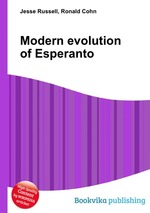Modern evolution of Esperanto
Jesse Russell Ronald Cohn
бумажная книга
High Quality Content by WIKIPEDIA articles! Esperanto has been remarkably stable since its creation compared to other planned languages. This is due to the Declaration of Boulogne in 1905, which made the early works of Zamenhof binding; most attempts at change have been therefore seen as distinct language projects (so-called esperantidos), and in the main the Esperanto community has ignored them. The main change in the language has been a great expansion of the vocabulary, largely driven by translations of technical jargon, which is explicitly allowed for by Boulogne. However, there have been more subtle changes to syntax and semantics as the majority of Esperanto authors shifted from native speakers of Slavic and German to other languages, such as French and English. See History of Esperanto#Evolution of the language. This article considers some of the purposeful changes to the language since Boulogne.


